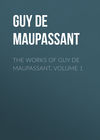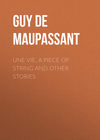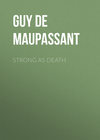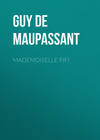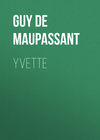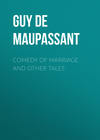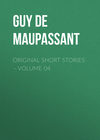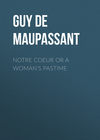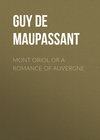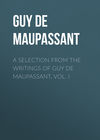Read the book: «The Works of Guy de Maupassant, Volume 1»
INTRODUCTION
BY
ARTHUR SYMONS
The first aim of art, no doubt, is the representation of things as they are. But then things are as our eyes see them and as our minds make them; and it is thus of primary importance for the critic to distinguish the precise qualities of the eyes and minds which make the world into imaginative literature. Reality may be so definite and so false, just as it may be so fantastic and so true; and, among work which we can apprehend as dealing justly with reality, there may be quite as much difference in all that constitutes outward form and likeness as there is between a Dutch interior by Peter van der Hooch, the portrait of a king by Velasquez, and the image of a woman smiling by Leonardo da Vinci. The soul, for instance, is at heart as real as the body; but, as we can hear it only through the body speaking, and see it only through bodily eyes, and measure it, often enough, only in the insignificant moment of its action, it may come to seem to us, at all events less realizable; and thus it is that we speak of those who have vividly painted exterior things as realists. Properly speaking, Maupassant is no more a realist than Maeterlinck. He paints a kind of reality which it is easier for us to recognize; that is all.
Every artist has his own vision of the world. Maupassant's vision was of solid superficies, of texture which his hands could touch, of actions which his mind could comprehend from the mere sight of its incidents. He saw the world as the Dutch painters saw it, and he was as great a master of form, of rich and sober color, of the imitation of the outward gestures of life, and of the fashion of external things. He had the same view of humanity, and shows us, with the same indifference, the same violent ferment of life – the life of full-blooded people who have to elbow their way through the world. His sense of desire, of greed, of all the baser passions, was profound: he had the terrible logic of animalism. Love-making, drunkenness, cheating, quarreling, the mere idleness of sitting drowsily in a chair, the gross life of the farmyard and the fields, civic dissensions, the sordid provincial dance of the seven deadly sins, he saw in the same direct, unilluminating way as the Dutch painters; finding, indeed, no beauty in any of these things, but getting his beauty in the deft arrangement of them, in the mere act of placing them in a picture. The world existed for him as something formless which could be cut up into little pictures. He saw no farther than the lines of his frame. The interest of the thing began inside that frame, and what remained outside was merely material.
A story of Maupassant, more than almost anything in the world, gives you the impression of manual dexterity. It is adequately thought out, but it does not impress you by its thought; it is clearly seen, but it does not impress you specially by the fidelity of its detail; it has just enough of ordinary human feeling for the limits it has imposed on itself. What impresses you is the extreme ingenuity of its handling; the way in which this juggler keeps his billiard-balls harmoniously rising and falling in the air. Often, indeed, you cannot help noticing the conscious smile which precedes the trick, and the confident bow which concludes it. He does not let you into the secret of the trick, but he prevents you from ignoring that it is after all, only a trick which you have been watching.
There is a philosophy of one kind or another behind the work of every artist. Maupassant's was a simple one, sufficient for his needs as he understood them, though perhaps really consequent upon his artistic methods, rather than at the root of them. It was the philosophy of cynicism: the most effectual means of limiting one's outlook, of concentrating all one's energies on the task in hand. Maupassant wrote for men of the world, and men of the world are content with the wisdom of their counting-houses. The man of the world is perfectly willing to admit that he is no better than you, because he takes it for granted that you will admit yourself to be no better than he. It is a way of avoiding comparison. To Maupassant this cynical point of view was invaluable for his purpose. He wanted to tell stories just for the pleasure of telling them; he wanted to concern himself with his story simply as a story; incidents interested him, not ideas, nor even characters, and he wanted every incident to be immediately effective. Now cynicism, in France, supplies a sufficient basis for all these requirements; it is the equivalent, for popular purposes, of that appeal to the average which in England is sentimentality. Compare, for instance, the admirable story "Boule de Suif," perhaps the best story which Maupassant ever wrote, with a story of somewhat similar motive – Bret Harte's "Outcasts of Poker Flat." Both stories are pathetic; but the pathos of the American (who had formed himself upon Dickens, and in the English tradition) becomes sentimental, and gets its success by being sentimental; while the pathos of the Frenchman (who has formed himself on Flaubert, and on French lines) gets its success precisely by being cynical.
And then the particular variety of Maupassant's cynicism was just that variation of the artistic idea upon the temperament which puts the best finish upon work necessarily so limited, obliged to be so clenching, as the short story. Flaubert's gigantic dissatisfaction with life, his really philosophic sense of its vanity, would have overweighted a writer so thoroughly equipped for his work as the writer of "Boule de Suif" and "La Maison Tellier." Maupassant had no time, he allowed himself no space, to reason about life; the need was upon him to tell story after story, each with its crisis, its thrill, its summing up of a single existence or a single action. The sharp, telling thrust that his conception of art demanded could be given only by a very specious, not very profound, very forthright, kind of cynicism, like the half kindly, half contemptuous laugh of the man who tells a good story at the club. For him it was the point of the epigram.
Maupassant was the man of his period, and his period was that of Naturalism. In "Les Soirees de Medan," the volume in which "Boule de Suif" appeared, there is another story called "Sac au Dos," in which another novelist made his appearance among the five who "publicly affirmed their literary tendencies" about the central figure of Zola. J. K. Huysmans, then but at the outset of his slow and painful course through schools and experiments, was in time to sum up the new tendencies of a new period, as significantly as Maupassant summed up in his short and brilliant, and almost undeviating career, the tendencies of that period in which Taine and science seemed to have at last found out the physical basis of life. Now it is a new realism which appeals to us: it is the turn of the soul. The battle which the "Soirees de Medan" helped to win has been won; having gained our right to deal with humble and unpleasant and sordidly tragic things in fiction, we are free to concern ourselves with other things. But though the period has passed, and will not return, the masterpieces of the period remain. Among these masterpieces are the novels and short stories of Guy de Maupassant.
Arthur Symons.
BOULE DE SUIF
For several days, straggling remnants of the routed army had passed through the town. There was no question of organized troops, it was simply a disjointed rabble, the men unshaven and dirty, their uniforms in tatters, slouching along without regimental colors, without order – worn out, broken down, incapable of thought or resolution, marching from pure habit and dropping with fatigue the moment they stopped. The majority belonged to the militia, men of peaceful pursuits, retired tradespeople, sinking under the weight of their accouterments; quick-witted little moblets as prone to terror as they were to enthusiasm, as ready to attack as they were to fly; and here and there a few red trousers, remnants of a company mowed down in one of the big battles; somber-coated artillerymen, side by side with these various uniforms of the infantry, and now and then the glittering helmet of a heavily booted dragoon who followed with difficulty the march of the lighter-footed soldiers of the line.
Companies of franc-tireurs, heroically named "Avengers of the Defeat," "Citizens of the Tomb," "Companies in Death," passed in their turn, looking like a horde of bandits.
Their chiefs – formerly drapers or corn-dealers, retired soap-boilers or suet-refiners, warriors of circumstance created officers for their money or the length of their moustaches, heaped with arms, flannels, and gold lace – talked loudly, discussed plans of campaign, and gave you to understand that they were the sole support of France in her death-agony; but they were generally in terror of their own soldiers, men "of the sack and cord," most of them brave to foolhardiness, all of them given to pillage and debauchery.
Report said that the Prussians were about to enter Rouen. The National Guard, which for two months past had made the most careful reconnoiterings in the neighboring wood, even to the extent of occasionally shooting their own sentries and putting themselves in battle array if a rabbit stirred in the brushwood, had now retired to their domestic hearths; their arms, their uniforms, all the murderous apparatus with which they had been wont to strike terror to the hearts of all beholders for three leagues round, had vanished.
Finally, the last of the French soldiery crossed the Seine on their way to Pont-Audemer by Saint Sever and Bourg-Achard; and then, last of all, came their despairing general tramping on foot between two orderlies, powerless to attempt any action with these disjointed fragments of his forces, himself utterly dazed and bewildered by the downfall of a people accustomed to victory and now so disastrously beaten in spite of its traditional bravery.
After that a profound calm, the silence of terrified suspense, fell over the city. Many a rotund bourgeois, emasculated by a purely commercial life, awaited the arrival of the victors with anxiety, trembling lest their meat-skewers and kitchen carving-knives should come under the category of arms.
Life seemed to have come to a standstill, the shops were closed, the streets silent. From time to time an inhabitant, intimidated by their silence, would flit rapidly along the pavement, keeping close to the walls.
In this anguish of suspense, men longed for the coming of the enemy.
In the latter part of the day following the departure of the French troops, some Uhlans, appearing from goodness knows where, traversed the city hastily. A little later, a black mass descended from the direction of Sainte-Catherine, while two more invading torrents poured in from the roads from Darnetal and Bois-guillaume. The advance guards of the three corps converged at the same moment into the square of the Hotel de Ville, while battalion after battalion of the German army wound in through the adjacent streets, making the pavement ring under their heavy rhythmic tramp.
Orders shouted in strange and guttural tones were echoed back by the apparently dead and deserted houses, while from behind the closed shutters eyes peered furtively at the conquerors, masters by right of might, of the city and the lives and fortunes of its inhabitants. The people in their darkened dwellings fell a prey to the helpless bewilderment which comes over men before the floods, the devastating upheavals of the earth, against which all wisdom and all force are unavailing. The same phenomenon occurs each time that the established order of things is overthrown, when public security is at an end, and when all that the laws of man or of nature protect is at the mercy of some blind elemental force. The earthquake burying an entire population under its falling houses; the flood that carries away the drowned body of the peasant with the carcasses of his cattle and the beams torn from his roof-tree; or the victorious army massacring those who defend their lives, and making prisoners of the rest – pillaging in the name of the sword, and thanking God to the roar of cannon – are so many appalling scourges which overthrow all faith in eternal justice, all the confidence we are taught to place in the protection of Providence and the reason of man.
Small detachments now began knocking at the doors and then disappearing into the houses. It was the occupation after the invasion. It now behooved the vanquished to make themselves agreeable to the victors.
After a while, the first alarms having subsided, a new sense of tranquillity began to establish itself. In many families the Prussian officer shared the family meals. Not infrequently he was a gentleman, and out of politeness expressed his commiseration with France and his repugnance at having to take part in such a war. They were grateful enough to him for this sentiment – besides, who knew when they might not be glad of his protection? By gaining his good offices one might have fewer men to feed. And why offend a person on whom one was utterly dependent? That would not be bravery but temerity, a quality of which the citizens of Rouen could no longer be accused as in the days of those heroic defenses by which the city had made itself famous. Above all, they said, with the unassailable urbanity of the Frenchman, it was surely permissible to be on politely familiar terms in private, provided one held aloof from the foreign soldier in public. In the street, therefore, they ignored one another's existence, but once indoors they were perfectly ready to be friendly, and each evening found the German staying longer at the family fireside.
The town itself gradually regained its wonted aspect. The French inhabitants did not come out much, but the Prussian soldiers swarmed in the streets. For the rest, the blue hussar officers who trailed their mighty implements of death so arrogantly over the pavement did not appear to entertain a vastly deeper grade of contempt for the simple townsfolk than did the officers of the Chasseurs who had drunk in the same cafés the year before. Nevertheless there was a something in the air; something subtle and indefinable, an intolerably unfamiliar atmosphere like a widely diffused odor – the odor of invasion. It filled the private dwellings and the public places, it affected the taste of food, and gave one the impression of being on a journey, far away from home, among barbarous and dangerous tribes.
The conquerors demanded money – a great deal of money. The inhabitants paid and went on paying; for the matter of that, they were rich. But the wealthier a Normandy tradesman becomes, the more keenly he suffers at each sacrifice each time he sees the smallest particle of his fortune pass into the hands of another.
Two or three leagues beyond the town, however, following the course of the river about Croisset Dieppedalle or Biessard, the sailors and the fishermen would often drag up the swollen corpse of some uniformed German, killed by a knife-thrust or a kick, his head smashed in by a stone, or thrown into the water from some bridge. The slime of the river bed swallowed up many a deed of vengeance, obscure, savage, and legitimate; unknown acts of heroism, silent onslaughts more perilous to the doer than battles in the light of day and without the trumpet blasts of glory.
For hatred of the Alien is always strong enough to arm some intrepid beings who are ready to die for an Idea.
At last, seeing that though the invaders had subjected the city to their inflexible discipline they had not committed any of the horrors with which rumor had accredited them throughout the length of their triumphal progress, the worthy tradespeople took heart of grace and the commercial spirit began once more to stir within them. Some of them who had grave interests at stake at Havre, then occupied by the French army, purposed trying to reach that port by going overland to Dieppe and there taking ship.
They took advantage of the influence of German officers whose acquaintance they had made, and a passport was obtained from the general in command.
Having therefore engaged a large diligence with four horses for the journey, and ten persons having entered their names at the livery stable office, they resolved to start on the Tuesday morning before daybreak, to avoid all public remark.
For some days already the ground had been hard with frost, and on the Monday, about three o'clock in the afternoon, thick dark clouds coming up from the north brought the snow, which fell without intermission all the evening and during the whole night.
At half past four the travelers were assembled in the courtyard of the Hotel de Normandie, from whence they were to start.
They were all still half asleep, their teeth chattering with cold in spite of their thick wraps. It was difficult to distinguish one from another in the darkness, their heaped-up winter clothing making them look like fat priests in long cassocks. Two of the men, however, recognized each other; they were joined by a third, and they began to talk. "I am taking my wife with me," said one. "So am I." "And I too." The first one added: "We shall not return to Rouen, and if the Prussians come to Havre we shall slip over to England."
They were all like-minded and all had the same project.
Meanwhile there was no sign of the horses being put in. A small lantern carried by a hostler appeared from time to time out of one dark doorway only to vanish instantly into another. There was a stamping of horses' hoofs deadened by the straw of the litter, and the voice of a man speaking to the animals and cursing sounded from the depths of the stables. A faint sound of bells gave evidence of harnessing, and became presently a clear and continuous jingle timed by the movement of the beast, now stopping, now going on again with a brisk shake, and accompanied by the dull tramp of hob-nailed sabots.
A door closed sharply. All sound ceased. The frozen travelers were silent, standing stiff and motionless. A veil of white snow-flakes glistened incessantly as it fell to the ground, blotting out the shape of things, powdering everything with an icy froth; and in the utter stillness of the town, quiet and buried under its winter pall, nothing was audible but this faint, fluttering, and indefinable rustle of falling snow – more a sensation than a sound – the intermingling of ethereal atoms seeming to fill space, to cover the world.
The man reappeared with his lantern, dragging after him by a rope a dejected and unwilling horse. He pushed it against the pole, fixed the traces, and was occupied for a long time in buckling the harness, having only the use of one hand as he carried the lantern in the other. As he turned away to fetch the other horse he caught sight of the motionless group of travelers, by this time white with snow. "Why don't you get inside the carriage?" he said, "you would at least be under cover."
It had never occurred to them, and they made a rush for it. The three men packed their wives into the upper end and then got in themselves, after which other distinct and veiled forms took the remaining seats without exchanging a word.
The floor of the vehicle was covered with straw into which the feet sank. The ladies at the end, who had brought little copper charcoal foot-warmers, proceeded to light them, and for some time discussed their merits in subdued tones, repeating to one another things which they had known all their lives.
At last, the diligence having been furnished with six horses instead of four on account of the difficulties of the road, a voice outside asked, "Is everybody here?" A voice from within answered "Yes," and they started.
The conveyance advanced slowly – slowly – the wheels sinking in the snow; the whole vehicle groaned and creaked, the horses slipped, wheezed, and smoked, and the driver's gigantic whip cracked incessantly, flying from side to side, twining and untwining like a slender snake, and cutting sharply across one or other of the six humping backs, which would thereupon straighten up with a more violent effort.
Imperceptibly the day grew. The airy flakes which a traveler – a Rouennais "pur sang" – once likened to a shower of cotton, had ceased to fall; a dirty gray light filtered through the heavy thick clouds which served to heighten the dazzling whiteness of the landscape, where now a long line of trees crusted with icicles would appear, now a cottage with a hood of snow.
In the light of this melancholy dawn the occupants of the diligence began to examine one another curiously.
Right at the end, in the best seats, opposite to one another, dozed Madame and Monsieur Loiseau, whole-sale wine merchant of the Rue Grand Pont.
The former salesman of a master who had become bankrupt, Loiseau had bought up the stock and made his fortune. He sold very bad wine at very low prices to the small country retail dealers, and enjoyed the reputation among his friends and acquaintances of being an unmitigated rogue, a thorough Norman full of trickery and jovial humor.
His character for knavery was so well established that one evening at the Prefecture, Monsieur Tournel, a man of keen and trenchant wit, author of certain fables and songs – a local glory – seeing the ladies growing drowsy, proposed a game of "L'oiseau vole."1 The pun itself flew through the prefect's reception rooms and afterwards through the town, and for a whole month called up a grin on every face in the province.
Loiseau was himself a noted wag and famous for his jokes both good and bad, and nobody ever mentioned him without adding immediately, "That Loiseau is simply priceless!"
He was of medium height with a balloon-like stomach and a rubicund face framed in grizzled whiskers. His wife – tall, strong, resolute, loud in voice and rapid of decision – represented order and arithmetic in the business, which he enlivened by his jollity and bustling activity.
Beside them, in a more dignified attitude as befitted his superior station, sat Monsieur Carré-Lamadon, a man of weight; an authority on cotton, proprietor of three branch businesses, officer of the Legion of Honor and member of the General Council. All the time of the Empire he had remained leader of a friendly opposition, for the sole purpose of making a better thing out of it when he came round to the cause which he had fought with polite weapons, to use his own expression. Madame Carré-Lamadon, who was much younger than her husband, was the consolation of all officers of good family who might be quartered at the Rouen garrison. She sat there opposite to her husband, very small, very dainty, very pretty, wrapped in her furs, and regarding the lamentable interior of the vehicle with despairing eyes.
Their neighbors, the Count and Countess Hubert de Breville, bore one of the most ancient and noble names in Normandy. The Count, an elderly gentleman of dignified appearance, did all in his power to accentuate by every artifice of the toilet his natural resemblance to Henri Quatre, who, according to a legend of the utmost glory to the family, had honored with his royal embraces a Dame de Breville, whose husband had, in consequence, been made Count and Governor of the province.
A colleague of Monsieur Carré-Lamadon in the General Council, Count Hubert represented the Orleanist faction in the department. The history of his marriage with the daughter of a small tradesman of Nantes had always remained a mystery. But as the Countess had an air of grandeur, understood better than any one else the art of receiving, passed even for having been beloved by one of the sons of Louis Philippe, the neighboring nobility bowed down to her, and her salon held the first place in the county, the only one which preserved the traditions of the viel le galanterie and to which the entreé was difficult.
The fortune of the Brevilles – all in Government Funds – was reported to yield them an income of five hundred thousand francs.
The six passengers occupied the upper end of the conveyance, the representatives of revenued society, serene in the consciousness of its strength – honest well-to-do people possessed of Religion and Principles.
By some strange chance all the women were seated on the same side, the Countess having two sisters of Mercy for neighbors, wholly occupied in fingering their long rosaries and mumbling Paters and Aves. One of them was old and so deeply pitted with the small-pox that she looked as if she had received a charge of grape shot full in the face; the other was very shadowy and frail, with a pretty unhealthy little face, a narrow phthisical chest, consumed by that devouring faith which creates martyrs and ecstatics.
Seated opposite to the two nuns were a man and woman who excited a good deal of attention.
The man, who was well known, was Cornudet, "the demon," the terror of all respectable, law-abiding people. For twenty years he had dipped his great red beard into the beer mugs of all the democratic café's. In the company of kindred spirits he had managed to run through a comfortable little fortune inherited from his father, a confectioner, and he looked forward with impatience to the Republic, when he should obtain the well-merited reward for so many revolutionary draughts. On the Fourth of September – probably through some practical joke – he understood that he had been appointed prefect, but on attempting to enter upon his duties the clerks, who had remained sole masters of the offices, refused to recognize him, and he was constrained to retire. For the rest, he was a good fellow, inoffensive and serviceable, and had busied himself with incomparable industry in organizing the defense of the town; had had holes dug all over the plain, cut down all the young trees in the neighboring woods, scattered pitfalls up and down all the high roads, and at the threatened approach of the enemy – satisfied with his preparations – had fallen back with all haste on the town. He now considered that he would be more useful in Havre, where fresh entrenchments would soon become necessary.
The woman, one of the so-called "gay" sisterhood, was noted for her precocious stoutness, which had gained her the nickname of "Boule de Suif" – "ball of fat." She was a little roly-poly creature, cushioned with fat, with podgy fingers squeezed in at the joints like rows of thick, short sausages; her skin tightly stretched and shiny, her bust enormous, and yet with it all so wholesomely, temptingly fresh and appetizing that it was a pleasure to look at her. Her face was like a ruddy apple – a peony rose just burst into bloom – and out of it gazed a pair of magnificent dark eyes overshadowed by long thick lashes that deepened their blackness; and lower down, a charming little mouth, dewy to the kiss, and furnished with a row of tiny milk-white teeth. Over and above all this she was, they said, full of inestimable qualities.
No sooner was her identity recognized than a whisper ran through the ladies in which the words "prostitute" and "public scandal," were so conspicuously distinct that she raised her head and retaliated by sweeping her companions with such a bold and defiant look that deep silence instantly fell upon them, and they all cast down their eyes with the exception of Loiseau, who watched her with a kindling eye.
However, conversation was soon resumed between the three ladies, whom the presence of this "person" had suddenly rendered friendly – almost intimate. It seemed to them that they must, as it were, raise a rampart of their dignity as spouses between them and this shameless creature who made a traffic of herself; for legalized love always takes a high hand with her unlicensed sister.
The three men too, drawn to one another by a conservative instinct at sight of Cornudet, talked money in a certain tone of contempt for the impecunious. Count Hubert spoke of the damage inflicted on him by the Prussians, of the losses which would result to him from the seizing of cattle and from ruined crops, but with all the assurance of a great landed proprietor, ten times millionaire, whom these ravages might inconvenience for the space of a year at most. Monsieur Carré-Lamadon, of great experience in the cotton industry, had taken the precaution to send six hundred thousand francs across to England as provision against a rainy day. As for Loiseau, he made arrangements to sell all the wine in his cellars to the French commission of supplies, consequently the Government owed him a formidable sum, which he counted upon receiving at Havre.
The three exchanged rapid and amicable glances. Although differing in position they felt themselves brothers in money, and of the great freemasonry of those who possess, of those who can make the gold jingle when they put their hands in the breeches-pockets.
The diligence went so slowly that by ten o'clock in the morning they had not made four leagues. The men got out three times and climbed the hill on foot. They began to grow anxious, for they were to have lunched at Totes, and now they despaired of reaching that place before night. Everybody was on the look-out for some inn by the way, when the vehicle stuck fast in a snowdrift, and it took two hours to get it out.
Meanwhile the pangs of hunger began to affect them severely both in mind and body, and yet not an inn, not a tavern even, was to be seen; the approach of the Prussians and the passage of the famished French troops had frightened away all trade.
The gentlemen foraged diligently for the provisions in the farms by the roadside; but they failed to obtain so much as a piece of bread, for the mistrustful peasant hid all reserve stores for fear of being pillaged by the soldiers, who, having no food supplied to them, took by force everything they could lay their hands on.
